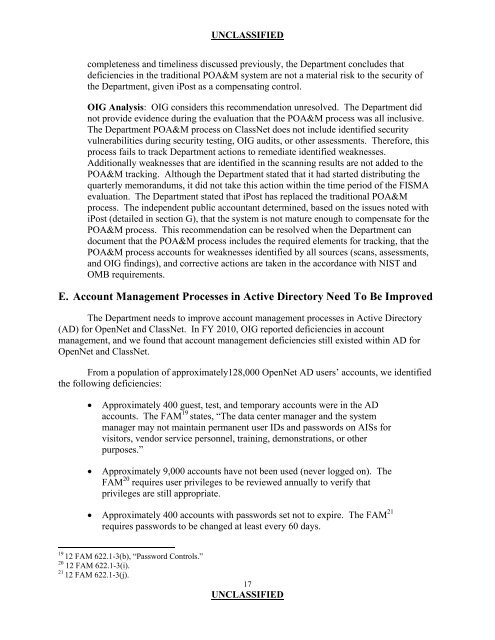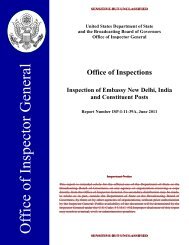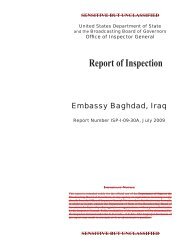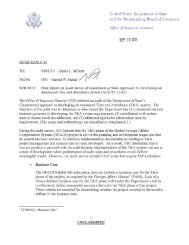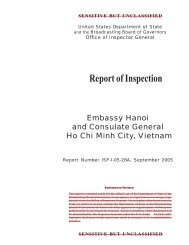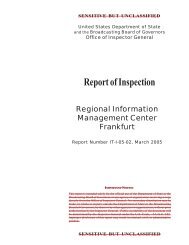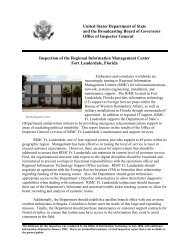Evaluation of Department of State Information Security Program ...
Evaluation of Department of State Information Security Program ...
Evaluation of Department of State Information Security Program ...
You also want an ePaper? Increase the reach of your titles
YUMPU automatically turns print PDFs into web optimized ePapers that Google loves.
UNCLASSIFIED<br />
completeness and timeliness discussed previously, the <strong>Department</strong> concludes that<br />
deficiencies in the traditional POA&M system are not a material risk to the security <strong>of</strong><br />
the <strong>Department</strong>, given iPost as a compensating control.<br />
OIG Analysis: OIG considers this recommendation unresolved. The <strong>Department</strong> did<br />
not provide evidence during the evaluation that the POA&M process was all inclusive.<br />
The <strong>Department</strong> POA&M process on ClassNet does not include identified security<br />
vulnerabilities during security testing, OIG audits, or other assessments. Therefore, this<br />
process fails to track <strong>Department</strong> actions to remediate identified weaknesses.<br />
Additionally weaknesses that are identified in the scanning results are not added to the<br />
POA&M tracking. Although the <strong>Department</strong> stated that it had started distributing the<br />
quarterly memorandums, it did not take this action within the time period <strong>of</strong> the FISMA<br />
evaluation. The <strong>Department</strong> stated that iPost has replaced the traditional POA&M<br />
process. The independent public accountant determined, based on the issues noted with<br />
iPost (detailed in section G), that the system is not mature enough to compensate for the<br />
POA&M process. This recommendation can be resolved when the <strong>Department</strong> can<br />
document that the POA&M process includes the required elements for tracking, that the<br />
POA&M process accounts for weaknesses identified by all sources (scans, assessments,<br />
and OIG findings), and corrective actions are taken in the accordance with NIST and<br />
OMB requirements.<br />
E. Account Management Processes in Active Directory Need To Be Improved<br />
The <strong>Department</strong> needs to improve account management processes in Active Directory<br />
(AD) for OpenNet and ClassNet. In FY 2010, OIG reported deficiencies in account<br />
management, and we found that account management deficiencies still existed within AD for<br />
OpenNet and ClassNet.<br />
From a population <strong>of</strong> approximately128,000 OpenNet AD users’ accounts, we identified<br />
the following deficiencies:<br />
� Approximately 400 guest, test, and temporary accounts were in the AD<br />
accounts. The FAM 19 states, “The data center manager and the system<br />
manager may not maintain permanent user IDs and passwords on AISs for<br />
visitors, vendor service personnel, training, demonstrations, or other<br />
purposes.”<br />
� Approximately 9,000 accounts have not been used (never logged on). The<br />
FAM 20 requires user privileges to be reviewed annually to verify that<br />
privileges are still appropriate.<br />
� Approximately 400 accounts with passwords set not to expire. The FAM 21<br />
requires passwords to be changed at least every 60 days.<br />
19 12 FAM 622.1-3(b), “Password Controls.”<br />
20 12 FAM 622.1-3(i).<br />
21 12 FAM 622.1-3(j).<br />
17<br />
UNCLASSIFIED


